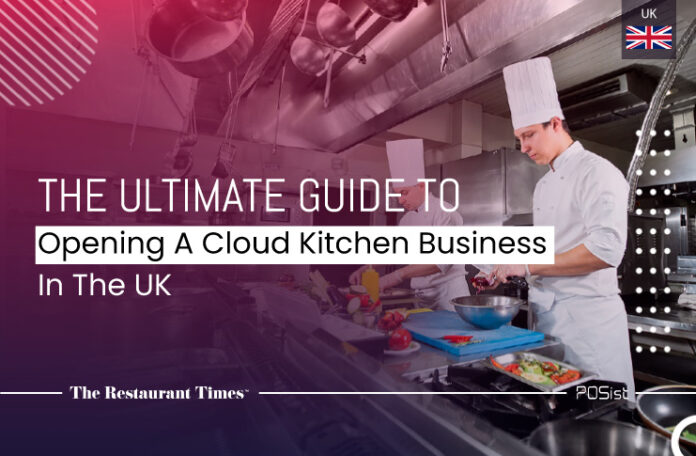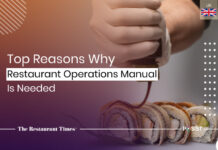The online food delivery market size in the UK is projected to grow from USD 11.3 billion (GBP 8.4 billion) in 2021 to USD 17.2 billion (GBP 12.8 billion) by 2025, indicating a CAGR of 11.0%. However, high start-up costs, increasing rentals, thinning operating margins, and regulations are some of the factors influencing the UK’s food industry. Restaurateurs have been forced to explore alternatives to traditional dine-in restaurants. Cloud Kitchen has emerged as an ingenious solution to the ongoing issues that are plaguing the UK food industry. It has been gaining ground as a healthy annexe to the food economy in the UK in the last couple of years. Around 750 cloud kitchens are currently operating in the UK, with more being set up every day.
What Is A Cloud Kitchen?
A cloud kitchen is a kitchen space that primarily caters to online food orders and delivery. In simple words, it is a delivery-only eatery format with no dine-in facility. The following sequence takes place in a cloud kitchen – order comes in, the meal is cooked, food is packed and delivered to the given location. Cloud kitchen is also popularly known as ghost kitchen, dark kitchen, satellite kitchen, and virtual restaurant.
Step-by-Step Guide For Starting A Cloud Kitchen In The UK
The low investment, high-profit margin, and scalability of cloud kitchen business are turning many heads. Since the pandemic, it has gained more popularity due to the restrictions by the government preventing people from eating inside F&B outlets. So, without any delay, let’s go through the step-by-step guide that will help you start a profitable cloud kitchen in the UK.
1. Decide The Business Model
Over the years, the cloud kitchen business has evolved into many variants. So, you need to select the business model that suits you the best. The six most common variants of cloud kitchen business models are as follows:
- Standalone Cloud Kitchen
- Multi-brand Cloud Kitchen
- Virtual Restaurant
- Shared Kitchen Space
- Operator Managed Cloud Kitchen
- Aggregator Managed Cloud Kitchen
2. Select Location And Property
A cloud kitchen doesn’t require a property in a prime location with high footfall. So, you can easily set it up in a relatively remote location with an area of up to 300 sq. ft. Also, since it doesn’t require any storefront, a cloud kitchen can be set up within residential areas, unused parking spaces, and market backsides. This is one of the significant differentiators as compared to a traditional dine-in restaurant.
3. Get The License And Approval
As per the Food Hygiene (England) Regulations 2013, you need to register the food business with the local authority at least four weeks before commencing its operations. Further, the establishment will require food premises approval if you are not selling directly to the consumers.
It is advisable to get the business registered within the prescribed period (four weeks) from the date of commencement of the business. Otherwise, you may end up in jail for up to two years or be imposed a fine or both if you run your food business without registration.
4. Purchase Kitchen Equipment And Packaging
In the case of a cloud kitchen, a significant share of the initial capital outlay goes into purchasing kitchen equipment. The list of equipment that you need to buy upfront includes an oven, burner, refrigerator, utensils, cutting counters, and so on. You may even opt to rent an operational cloud kitchen equipped with all the basic gears and then customize it as per your requirement.
Packaging is key to a cloud kitchen business as it is the only point of contact between you and the customer. So, try to develop your brand through innovative packaging and at the same time ensure that the food is adequately sealed to evade any kind of contamination or spillage.
5. Recruit Skilled Staff
Since there is no storefront or dine-in facility, you won’t have to hire too many staff. You can start a cloud kitchen with only 4-5 highly skilled staff members who will be engaged in food preparation and delivery. It is better, to begin with, a small team and gradually hire more people based on actual business growth.
6. Marketing And Promotion
A cloud kitchen primarily depends on online and telephonic orders. So, in the initial days, you need to spend on marketing and promotion to build brand awareness among your potential customers. Some of the most common marketing and promotional options are:
- List your business on online food aggregators and promote using paid marketing.
- Create a business page on Instagram, Facebook, and Twitter and regularly post appealing pictures of food and other promotions.
- Create customized and targeted SMS and email based on order history.
For more effective ways to increase sales, please check here.
7. Invest In Technology
Technology plays a crucial role in the cloud kitchen business. Hence, it is advisable to invest in cloud kitchen software that can facilitate integrated online restaurant ordering systems while aiding other day-to-day operations. Some ways in which it can assist your business are:
- Manages a centralized order-taking process and assigns outlets based on proximity to the customers.
- Creates a centralized panel for managing orders for multiple brands (in the case of multi-brand cloud kitchen).
- Manages stock requirements of the cloud kitchen by setting re-order levels and reminders to order.
- Keeps track of all activities, such as time taken to prepare the dishes, time taken to deliver food, etc., which can be analyzed for assessing operational efficiency.
- Assigns orders automatically to the respective delivery partners, allowing you to accept and handle a large volume of orders with greater ease.
Although these are still early days for cloud kitchen, its advantages indicate that this business model is here to stay. In fact, it is likely to grow as they are becoming the first preference of consumers globally. So, if you are an aspiring restaurateur, then you should consider this business model as a viable option for venturing into the UK food industry.


















